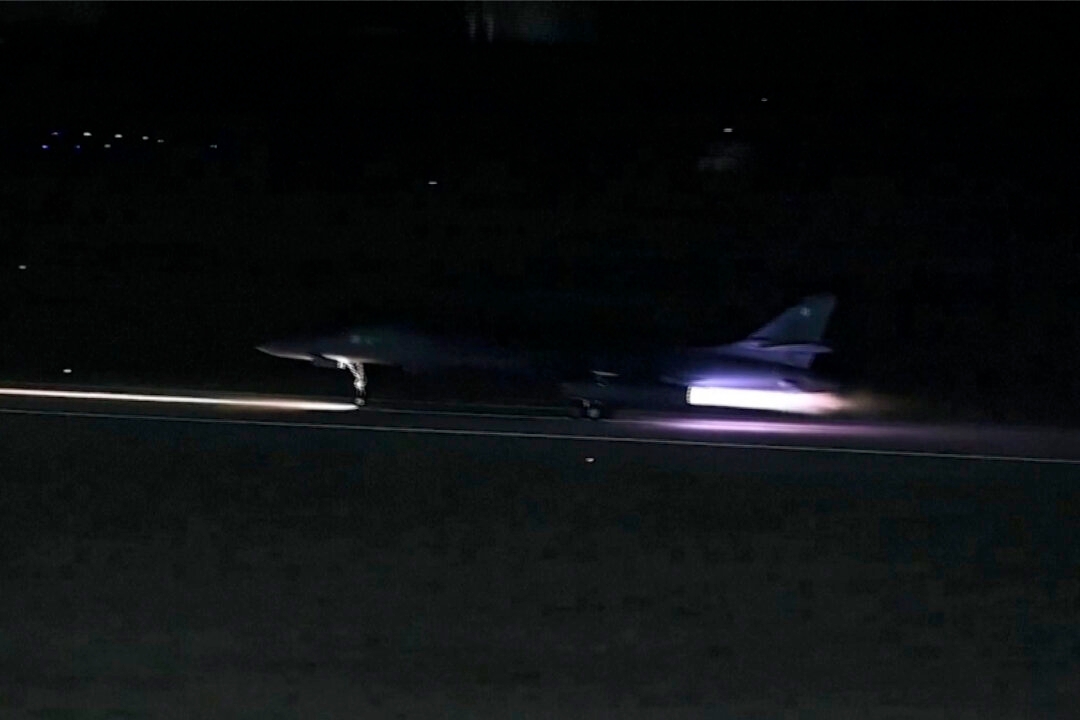By Andrew Thornebrooke | Epoch Times
The US military struck 85 targets, marking the start of an ongoing campaign in response to an Iran-backed drone strike that killed 3 American soldiers.

The United States has begun its retaliation against Iran-backed groups in Iraq and Syria for their alleged involvement in an attack last week that killed three U.S. service members.
U.S. forces conducted airstrikes against more than 85 targets in Iraq and Syria against Iran’s Islamic Revolutionary Guards Corps (IRGC), Quds Force, and affiliated militia groups, according to a statement released by U.S. Central Command, which oversees operations in the region.
The strikes were conducted with “numerous aircraft to include long-range bombers flown from [the] United States” and “employed more than 125 precision munitions.”
The retaliatory strikes will continue, President Joe Biden said in a statement, “at times and places of our choosing.”
Central Command said that the strikes targeted facilities associated with the terror network’s “command and control operations centers, intelligence centers, rockets and missiles, and unmanned aerial vehicle storages, and logistics and munition supply chain facilities of militia groups and their IRGC sponsors who facilitated attacks against U.S. and Coalition forces.”
US Seeks Display of Force After Delay
President Biden has come under increasing pressure over the last week to mount a vigorous response to the drone attack in Jordan that left three Army reservists dead and 40 more injured.
The president issued a statement shortly after the strikes were announced, reiterating his dedication to pursuing a multi-tiered response while stopping short of a war with Iran.
“The United States does not seek conflict in the Middle East or anywhere else in the world. But let all those who might seek to do us harm know this: If you harm an American, we will respond,” he said.
Defense Secretary Lloyd Austin confirmed in a separate statement that the military had conducted the strikes in accordance with the president’s strategy, and would pursue further action.
“This is the start of our response,” Mr. Austin said. “The President has directed additional actions to hold the IRGC and affiliated militias accountable for their attacks on U.S. and Coalition Forces. These will unfold at times and places of our choosing.”
The president said earlier in the week that he had decided what action to take in response to the attack, but the administration remained silent on what that retaliation would be until now.
White House National Security Council Spokesperson John Kirby told reporters that the “early stages of battle damage assessment” indicated the bombers used to strike the facilities were out of harm’s way but that there was not yet confirmation on casualties on the ground.
Part of the reason for the delay he added, was to afford optimal weather over all targets for the B-1 bombers used in the mission.
The Iraqi government was informed of the strikes ahead of time but, Mr. Kirby added, the administration has had no communications with Iran since the drone attack in Jordan.
“The targets were carefully chosen,” he said, to eliminate capabilities and leadership associated with the IRGC and the Islamic Resistance in Iraq.
When pressed on what types of information were used to corroborate that the strikes actually did target those responsible for the attack in Jordan, Mr. Kirby refused to discuss matters of intelligence.
The administration would not share “anything that’s going to make our jobs difficult,” he said.
The administration has formally blamed the attack on the Islamic Resistance in Iraq, an umbrella group uniting several terror organizations that broadly support Iranian goals in the region.
Relatedly, U.S. troops have come under attack more than 160 times in Iraq, Syria, and the Red Sea since October 2023, when the nation pledged its support for Israel’s war in Gaza.
Iran, the administration has made clear, “bears responsibility” for those attacks due to its continued material support of those groups.
Andrew Thornebrooke is a national security correspondent for The Epoch Times covering China-related issues with a focus on defense, military affairs, and national security. He holds a master’s in military history from Norwich University.

